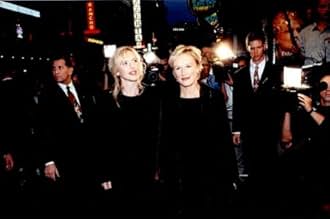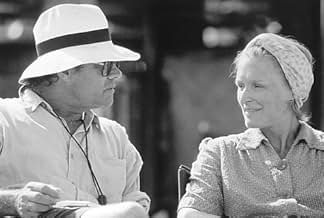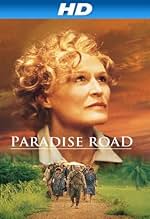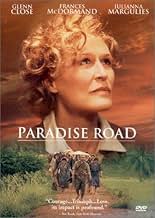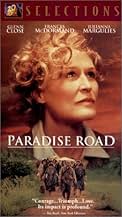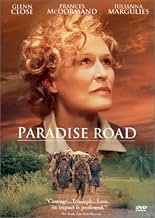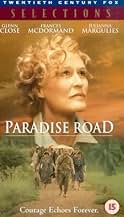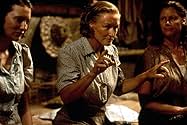NOTE IMDb
6,8/10
6,2 k
MA NOTE
Ajouter une intrigue dans votre langueA group of women who are imprisoned on the island of Sumatra by the Japanese during World War II use music to relieve their misery.A group of women who are imprisoned on the island of Sumatra by the Japanese during World War II use music to relieve their misery.A group of women who are imprisoned on the island of Sumatra by the Japanese during World War II use music to relieve their misery.
- Réalisation
- Scénario
- Casting principal
- Récompenses
- 1 victoire et 7 nominations au total
Johanna ter Steege
- Sister Wilhelminia
- (as Johanna Ter Steege)
Avis à la une
'Paradise Road' is not the first time the story of European and Australian prisoners of the Japanese during WW2 has been told - there is a famous old movie of Neville Shute's 'A Town Like Alice' and the BBC's wonderful tv series, 'Tenko', from the early 1980s. Nevertheless there is certainly scope for this film, which tells the story of a group of largely upper class women who have to come to terms with captivity and brutality as a 'defeated race' and somehow survive the war. The particular twist to this film is the fact-based story of the choir a group of women started in one camp. In other ways, however, the story is practically identical to 'Tenko', only crammed into around 2 hours instead of 30. This means that the effect is very much like watching one of those Reduced Shakespeare Company shows that do the Complete Works of Shakespeare in one performance. Virtually nothing happens in Paradise Road that doesn't happen in Tenko - fair enough, since it is fact based, but you feel like you're watching whole episodes crammed into a single line and you find yourself desperate for more character development - you never find out, for example, who Glenn Close's character really _is_. Despite this, the acting is top-hole and the script-writing is quite sparky, while production values are for the most part extremely high - this is a very good looking film. And therein lies a problem. While the violence is not sanitised, the starvation is. The women in this film appear to have suffered no more ill effects after 3 years of captivity and hard labour than a healthy sun tan and fetching urchin-style crop. The fight-in-the-shower scene shows us an array of perfect bodies with no sores, sunburn, bruises, skin diseases etc. (Again, Tenko did this much better.) When some of the women are meant to be dying of starvation towards the end the idea that these healthy women are meant to be suffering is so laughable as to be more like amateur dramatics than professional movie making. In failing to give a sense of the struggle to survive that the real women went through, this film diminishes their courage and does not do them justice.
This film is watchable, however, and tells stories that need to be told. Watch it by all means - but 'Tenko' is now out on video, so get that next!
This film is watchable, however, and tells stories that need to be told. Watch it by all means - but 'Tenko' is now out on video, so get that next!
I found this a very moving film about a group of fairly ordinary people placed in extraordinary conditions. I found myself quite involved with all the acting and the story line. Here is a film filled with outstanding and understated performances about people's ideals and courage being tested.
As to this story having been told in 2 or 3 other movies, I find that to be an incredible comment. I didn't see anyone saying that there had already been about 100 movies about men fighting in World War II when "Saving Private Ryan" came out. It is time that the stories of these extraordinary women be told. Soldiers aren't the only ones to suffer and die in wars.
As to this story having been told in 2 or 3 other movies, I find that to be an incredible comment. I didn't see anyone saying that there had already been about 100 movies about men fighting in World War II when "Saving Private Ryan" came out. It is time that the stories of these extraordinary women be told. Soldiers aren't the only ones to suffer and die in wars.
I love this movie because I love the characterization of the women in it. I felt powerfully with the women, felt I knew them, felt complete identification with most of them.
I actually think it's hard to specify the actions and words that will make a character both realistic and sympathetic. Showing mere suffering won't do it. But here, Mr. Beresford has been able to stir such warm feelings (particularly toward the Roberts girl, the Glenn Close and Jennifer Ehle, her Dutch friend, and the Cate Blanchett characters). The romanticism, cheer and background of the Ehle character are particularly well drawn.
This is a far superior movie to 'Platoon', by the way - and a wonderful tribute to those who went through the awful 3.5 year ordeal.
Another thing I quite liked (these days) was to see a movie that did not attempt to make the Caucasians the moral villain relative to the other race depicted.
This is not a movie concerned with p.c. appearances - the Japanese are not shown as somehow merely "different", a difference we "simply cannot understand or judge" because of our different culture. Setting a woman on fire for bargaining for medicine for a sick elderly woman is brutality in any culture - and this movie does not attempt to minimize the moral wrong.
Bravo, Mr. Beresford.
I actually think it's hard to specify the actions and words that will make a character both realistic and sympathetic. Showing mere suffering won't do it. But here, Mr. Beresford has been able to stir such warm feelings (particularly toward the Roberts girl, the Glenn Close and Jennifer Ehle, her Dutch friend, and the Cate Blanchett characters). The romanticism, cheer and background of the Ehle character are particularly well drawn.
This is a far superior movie to 'Platoon', by the way - and a wonderful tribute to those who went through the awful 3.5 year ordeal.
Another thing I quite liked (these days) was to see a movie that did not attempt to make the Caucasians the moral villain relative to the other race depicted.
This is not a movie concerned with p.c. appearances - the Japanese are not shown as somehow merely "different", a difference we "simply cannot understand or judge" because of our different culture. Setting a woman on fire for bargaining for medicine for a sick elderly woman is brutality in any culture - and this movie does not attempt to minimize the moral wrong.
Bravo, Mr. Beresford.
First class work here. The film follows a group of women captured in Asia by the Japanese, and interned as enemy aliens. It shows the inhuman brutality that the Japanese inflicted on anyone they considered to be of an inferior race. (i.e. not Japanese) (for that matter anyone not samurai) As a coping mechanism, and partially in defiance of their captors, the women form a vocal orchestra, playing the parts of classical music with only their voices. The music soothes the women, those in the orchestra, and those who aren't. The Japanese soldiers even come to enjoy the sound, and the atrocity rate drops a couple of notches.
Stand out performances abound here. In fact I can't really single out any of the cast. They were all good, including the Japanese actors. I had thought from the reviews that the music would be the largest part of the film, with just the backdrop of the prison camp, but it really wasn't. I recommend this film.
Stand out performances abound here. In fact I can't really single out any of the cast. They were all good, including the Japanese actors. I had thought from the reviews that the music would be the largest part of the film, with just the backdrop of the prison camp, but it really wasn't. I recommend this film.
The film was both moving and heart warming. It shows the unbelievable story of a group of women surviving a PoW camp against all the odds. I found it hard to believe that anyone was made to live in the conditions they were put in and live to tell the story. The acting was excellent and i don't think this film has got the praise it deserves. It is made even more moving by the fact it is based on a true story.
Le saviez-vous
- AnecdotesThe music in the film was derived from the actual score transcripts used in the P.O.W camps which survived World War II.
- GaffesThe women of the choir did the singing while sitting down because of having to work in the extreme heat during the day left them exhausted.
- Citations
Adrienne Pargiter: You don't hate them do you?
Margaret Drummond: No.
Adrienne Pargiter: Why not?
Margaret Drummond: I've tried, but I can't bring myself to hate people. The worse they behave, the sorrier I feel for them.
- Bandes originalesSymphony No. 9 in E minor Op. 95 'From the New World' II. Largo
Written by Antonín Dvorák (as Antonin Dvorak)
Meilleurs choix
Connectez-vous pour évaluer et suivre la liste de favoris afin de recevoir des recommandations personnalisées
- How long is Paradise Road?Alimenté par Alexa
Détails
- Date de sortie
- Pays d’origine
- Langues
- Aussi connu sous le nom de
- Дорога в рай
- Lieux de tournage
- Sociétés de production
- Voir plus de crédits d'entreprise sur IMDbPro
Box-office
- Budget
- 16 000 000 $US (estimé)
- Montant brut aux États-Unis et au Canada
- 2 007 100 $US
- Week-end de sortie aux États-Unis et au Canada
- 62 518 $US
- 13 avr. 1997
- Montant brut mondial
- 2 007 100 $US
- Durée2 heures 2 minutes
- Couleur
- Mixage
- Rapport de forme
- 2.35 : 1
Contribuer à cette page
Suggérer une modification ou ajouter du contenu manquant



